The silly captions originate from the news wires. And some of them are really silly. Enjoy.
First off, from the Coptic Orthodox Church, a non-Chalcedonian member of the Oriental Orthodox communion. It was founded by St. Mark, the Evangelist and is the main Christian Church in Egypt.

 Pope Shenouda III, the ailing head of Egypt's Coptic Orthodox Church, prays during the Christmas mass at the Saint Mark Coptic Orthodox Cathedral in Cairo, Egypt, late Sunday, Jan. 6, 2008. Coptic Christians make up an estimated 10 percent of Egypt's 76.5 million people and generally live in peace with the Muslim majority. (AP Photo/Amr Nabil)
Pope Shenouda III, the ailing head of Egypt's Coptic Orthodox Church, prays during the Christmas mass at the Saint Mark Coptic Orthodox Cathedral in Cairo, Egypt, late Sunday, Jan. 6, 2008. Coptic Christians make up an estimated 10 percent of Egypt's 76.5 million people and generally live in peace with the Muslim majority. (AP Photo/Amr Nabil) His Holiness Pope Shenouda III, the 117th Pope of the Coptic Orthodox Church of Alexandria and Patriarch of the See of St. Mark Cathedral, attends a Coptic Christmas eve mass in Cairo early January 7, 2008. REUTERS/Nasser Nuri (EGYPT)
His Holiness Pope Shenouda III, the 117th Pope of the Coptic Orthodox Church of Alexandria and Patriarch of the See of St. Mark Cathedral, attends a Coptic Christmas eve mass in Cairo early January 7, 2008. REUTERS/Nasser Nuri (EGYPT) Coptic Orthodox high priests attend a traditional Coptic Christmas eve mass at the St. Mark Cathedral in Cairo early January 7, 2008. REUTERS/Nasser Nuri (EGYPT)
Coptic Orthodox high priests attend a traditional Coptic Christmas eve mass at the St. Mark Cathedral in Cairo early January 7, 2008. REUTERS/Nasser Nuri (EGYPT) His Holiness Pope Shenouda III, the 117th Pope of the Coptic Orthodox Church of Alexandria and Patriarch of the See of St. Mark Cathedral, attends a Coptic Christmas eve mass in Cairo early January 7, 2008. REUTERS/Nasser Nuri (EGYPT)
His Holiness Pope Shenouda III, the 117th Pope of the Coptic Orthodox Church of Alexandria and Patriarch of the See of St. Mark Cathedral, attends a Coptic Christmas eve mass in Cairo early January 7, 2008. REUTERS/Nasser Nuri (EGYPT) His Holiness Pope Shenouda III, the 117th Pope of the Coptic Orthodox Church of Alexandria and Patriarch of the See of St. Mark Cathedral, attends a Coptic Christmas eve mass in Cairo early January 7, 2008. REUTERS/Nasser Nuri (EGYPT)
His Holiness Pope Shenouda III, the 117th Pope of the Coptic Orthodox Church of Alexandria and Patriarch of the See of St. Mark Cathedral, attends a Coptic Christmas eve mass in Cairo early January 7, 2008. REUTERS/Nasser Nuri (EGYPT) His Holiness Pope Shenouda III, the 117th Pope of the Coptic Orthodox Church of Alexandria and Patriarch of the See of St. Mark Cathedral, attends a mass in Cairo January 7, 2008. After the mass, the faithful will end their 45-day fast. REUTERS/Nasser Nuri (EGYPT)
His Holiness Pope Shenouda III, the 117th Pope of the Coptic Orthodox Church of Alexandria and Patriarch of the See of St. Mark Cathedral, attends a mass in Cairo January 7, 2008. After the mass, the faithful will end their 45-day fast. REUTERS/Nasser Nuri (EGYPT) Georgians walk to attend the Orthodox Christmas service at Trinity Cathedral complex in Tbilisi, Georgia, late Sunday, Jan. 6, 2008. The Eastern Orthodox Churches mark Christmas according to the old calendar, two weeks after Western denominations. (AP Photo/Shakh Aivazov)
Georgians walk to attend the Orthodox Christmas service at Trinity Cathedral complex in Tbilisi, Georgia, late Sunday, Jan. 6, 2008. The Eastern Orthodox Churches mark Christmas according to the old calendar, two weeks after Western denominations. (AP Photo/Shakh Aivazov) Georgians Orthodox believers touch the Ilia II, Catholicos-Patriarch of All Georgia and the spiritual leader of the Georgian Orthodox Church, before the Orthodox Christmas service at Trinity Cathedral complex in Tbilisi, Georgia, Sunday, Jan. 6, 2008. The Eastern Orthodox Churches mark the occasion according to the old calendar, two weeks after Western denominations. (AP Photo/Sergey Ponomarev)
Georgians Orthodox believers touch the Ilia II, Catholicos-Patriarch of All Georgia and the spiritual leader of the Georgian Orthodox Church, before the Orthodox Christmas service at Trinity Cathedral complex in Tbilisi, Georgia, Sunday, Jan. 6, 2008. The Eastern Orthodox Churches mark the occasion according to the old calendar, two weeks after Western denominations. (AP Photo/Sergey Ponomarev) Georgians light candles marking the Orthodox Christmas at Trinity Cathedral complex in Tbilisi, Georgia, late Sunday, Jan. 6, 2008. The Eastern Orthodox Churches mark the occasion according to the old calendar, two weeks after Western denominations. (AP Photo/Sergey Ponomarev)
Georgians light candles marking the Orthodox Christmas at Trinity Cathedral complex in Tbilisi, Georgia, late Sunday, Jan. 6, 2008. The Eastern Orthodox Churches mark the occasion according to the old calendar, two weeks after Western denominations. (AP Photo/Sergey Ponomarev) Georgians walk to attend the Orthodox Christmas service at Trinity Cathedral complex in Tbilisi, Georgia, late Sunday, Jan. 6, 2008. The Eastern Orthodox Churches mark the occasion according to the old calendar, two weeks after Western denominations. (AP Photo/Sergey Ponomarev)
Georgians walk to attend the Orthodox Christmas service at Trinity Cathedral complex in Tbilisi, Georgia, late Sunday, Jan. 6, 2008. The Eastern Orthodox Churches mark the occasion according to the old calendar, two weeks after Western denominations. (AP Photo/Sergey Ponomarev) Georgian children prepare to participate in a procession to mark Orthodox Christmas in downtown Tbilisi, Georgia, Monday, Jan. 7, 2008. Christmas falls on Jan. 7 for Orthodox Christians in the Holy Land, Russia and other Orthodox churches that use the old Julian calendar instead of the 16th-century Gregorian calendar adopted by Catholics and Protestants and commonly used in secular life around the world. (AP Photo/Sergei Grits)
Georgian children prepare to participate in a procession to mark Orthodox Christmas in downtown Tbilisi, Georgia, Monday, Jan. 7, 2008. Christmas falls on Jan. 7 for Orthodox Christians in the Holy Land, Russia and other Orthodox churches that use the old Julian calendar instead of the 16th-century Gregorian calendar adopted by Catholics and Protestants and commonly used in secular life around the world. (AP Photo/Sergei Grits) People march with national flags along a street in central Tbilisi during "Alilo", a religious procession to celebrate the Orthodox Christmas, January 7, 2008. Orthodox Christians celebrate Christmas according to the Julian calendar on January 7. REUTERS/Gleb Garanich (GEORGIA)
People march with national flags along a street in central Tbilisi during "Alilo", a religious procession to celebrate the Orthodox Christmas, January 7, 2008. Orthodox Christians celebrate Christmas according to the Julian calendar on January 7. REUTERS/Gleb Garanich (GEORGIA) Metropolitan Mrdja Nikolaj, the head of the Serb Orthodox Church in Bosnia, center, leads the Orthodox Christmas service in the Bosnian capital of Sarajevo, Monday, Jan. 7, 2008. Christmas falls on Jan. 7 for Orthodox Christians in the Holy Land, Russia and other Orthodox churches that use the old Julian calendar instead of the 16th-century Gregorian calendar adopted by Catholics and Protestants and commonly used in secular life around the world. (AP Photo/Hidajet Delic)
Metropolitan Mrdja Nikolaj, the head of the Serb Orthodox Church in Bosnia, center, leads the Orthodox Christmas service in the Bosnian capital of Sarajevo, Monday, Jan. 7, 2008. Christmas falls on Jan. 7 for Orthodox Christians in the Holy Land, Russia and other Orthodox churches that use the old Julian calendar instead of the 16th-century Gregorian calendar adopted by Catholics and Protestants and commonly used in secular life around the world. (AP Photo/Hidajet Delic) A Bosnian Orthodox Serb woman is reflected in an icon during a service on Christmas day inside the Saborna church in central Sarajevo January 7, 2008. Bosnian Orthodox believers celebrate Christmas by the Julian calendar, which has a difference of two weeks to the Gregorian calendar. REUTERS/Damir Sagolj (BOSNIA AND HERZEGOVINA)
A Bosnian Orthodox Serb woman is reflected in an icon during a service on Christmas day inside the Saborna church in central Sarajevo January 7, 2008. Bosnian Orthodox believers celebrate Christmas by the Julian calendar, which has a difference of two weeks to the Gregorian calendar. REUTERS/Damir Sagolj (BOSNIA AND HERZEGOVINA) Christian Serb Orthodox believers prepare to break traditional Christmas bread to mark the Orthodox Christmas Day festivities, in Belgrade, Serbia, Monday, Jan. 7, 2008. Christmas falls on Jan. 7 for Orthodox Christians in the Holy Land, Russia and other Orthodox churches that use the old Julian calendar instead of the 16th-century Gregorian calendar adopted by Catholics and Protestants and commonly used in secular life around the world. (AP Photo/Darko Vojinovic)
Christian Serb Orthodox believers prepare to break traditional Christmas bread to mark the Orthodox Christmas Day festivities, in Belgrade, Serbia, Monday, Jan. 7, 2008. Christmas falls on Jan. 7 for Orthodox Christians in the Holy Land, Russia and other Orthodox churches that use the old Julian calendar instead of the 16th-century Gregorian calendar adopted by Catholics and Protestants and commonly used in secular life around the world. (AP Photo/Darko Vojinovic) The head of Bosnia's Orthodox church Metropolitan Nikolaj attends a service on Christmas day inside the Saborna church in central Sarajevo January 7, 2008. Bosnian Orthodox believers celebrate Christmas by the Julian calendar, which has a difference of two weeks to the Gregorian calendar. REUTERS/Damir Sagolj (BOSNIA AND HERZEGOVINA)
The head of Bosnia's Orthodox church Metropolitan Nikolaj attends a service on Christmas day inside the Saborna church in central Sarajevo January 7, 2008. Bosnian Orthodox believers celebrate Christmas by the Julian calendar, which has a difference of two weeks to the Gregorian calendar. REUTERS/Damir Sagolj (BOSNIA AND HERZEGOVINA) Kosovo Serbs attend a service for Orthodox Christmas in the fire-gutted Serbian church in Mitrovica, 40 kilometres (30 miles) north of the Kosovo capital Pristina, January 7, 2008. Around 100 Serbs crossed the Mitrovica bridge into the Albanian-dominated south to attend the service. REUTERS/Hazir Reka (SERBIA)
Kosovo Serbs attend a service for Orthodox Christmas in the fire-gutted Serbian church in Mitrovica, 40 kilometres (30 miles) north of the Kosovo capital Pristina, January 7, 2008. Around 100 Serbs crossed the Mitrovica bridge into the Albanian-dominated south to attend the service. REUTERS/Hazir Reka (SERBIA) Kosovo Serbs attend a service for Orthodox Christmas in the fire-gutted Serbian church in Mitrovica, 40 kilometres (30 miles) north of the Kosovo capital Pristina, January 7, 2008. Around 100 Serbs crossed the Mitrovica bridge into the Albanian-dominated south to attend the service. REUTERS/Hazir Reka (SERBIA)
Kosovo Serbs attend a service for Orthodox Christmas in the fire-gutted Serbian church in Mitrovica, 40 kilometres (30 miles) north of the Kosovo capital Pristina, January 7, 2008. Around 100 Serbs crossed the Mitrovica bridge into the Albanian-dominated south to attend the service. REUTERS/Hazir Reka (SERBIA)
 Georgian KFOR soldiers light candles for Orthodox Christmas in the Serb monastery enclave of Gracanica, near the capital Pristina, January 7, 2008. Orthodox believers celebrate Christmas by the Julian calendar on January 7. The Julian calendar is two weeks behind the Gregorian calendar. REUTERS/Str (SERBIA)
Georgian KFOR soldiers light candles for Orthodox Christmas in the Serb monastery enclave of Gracanica, near the capital Pristina, January 7, 2008. Orthodox believers celebrate Christmas by the Julian calendar on January 7. The Julian calendar is two weeks behind the Gregorian calendar. REUTERS/Str (SERBIA) People burn dried oak branches which symbolize the Yule log for the Orthodox Christmas Eve in Belgrade January 6, 2008. Serbian Orthodox believers celebrate Christmas by the Julian calendar on January 7. The Julian calendar is two weeks behind the Gregorian calendar. REUTERS/Marko Djurica (SERBIA)
People burn dried oak branches which symbolize the Yule log for the Orthodox Christmas Eve in Belgrade January 6, 2008. Serbian Orthodox believers celebrate Christmas by the Julian calendar on January 7. The Julian calendar is two weeks behind the Gregorian calendar. REUTERS/Marko Djurica (SERBIA) A Serb orthodox man and a nun burn oak branches for the Orthodox Christmas Eve in front of the the Serb Orthodox Monastery of Gracanica on Sunday, Jan. 6, 2008. Serbian Orthodox believers will celebrate Christmas by the Julian calendar on Monday. ( AP Photo/Visar Kryeziu)
A Serb orthodox man and a nun burn oak branches for the Orthodox Christmas Eve in front of the the Serb Orthodox Monastery of Gracanica on Sunday, Jan. 6, 2008. Serbian Orthodox believers will celebrate Christmas by the Julian calendar on Monday. ( AP Photo/Visar Kryeziu) Russian Orthodox Voznesensky cathedral is illuminated against foggy sky during the night Christmas service in Almaty January 7, 2008. Orthodox Christians celebrate Christmas on January 7 according to the Julian calendar. REUTERS/Shamil Zhumatov (KAZAKHSTAN)
Russian Orthodox Voznesensky cathedral is illuminated against foggy sky during the night Christmas service in Almaty January 7, 2008. Orthodox Christians celebrate Christmas on January 7 according to the Julian calendar. REUTERS/Shamil Zhumatov (KAZAKHSTAN) Worshipers attend the night Orthodox Christmas service at Voznesensky cathedral in Almaty January 7, 2008. Orthodox Christians celebrate Christmas on January 7 according to the Julian calendar. REUTERS/Shamil Zhumatov (KAZAKHSTAN)
Worshipers attend the night Orthodox Christmas service at Voznesensky cathedral in Almaty January 7, 2008. Orthodox Christians celebrate Christmas on January 7 according to the Julian calendar. REUTERS/Shamil Zhumatov (KAZAKHSTAN) A woman is reflected in an icon during the night Orthodox Christmas service at Voznesensky cathedral in Almaty January 7, 2008. Orthodox Christians celebrate Christmas on January 7 according to the Julian calendar. REUTERS/Shamil Zhumatov (KAZAKHSTAN)
A woman is reflected in an icon during the night Orthodox Christmas service at Voznesensky cathedral in Almaty January 7, 2008. Orthodox Christians celebrate Christmas on January 7 according to the Julian calendar. REUTERS/Shamil Zhumatov (KAZAKHSTAN) Russian First Deputy Prime Minister and presidential candidate Dmitry Medvedev, left, talks with Russian Orthodox Church Patriarch Alexy II during Orthodox Christmas service in Moscow's Christ The Savior Cathedral, Monday, Jan. 7, 2008. Christmas falls on Jan. 7 for Orthodox Christians in the Holy Land, Russia and other Orthodox churches that use the old Julian calendar instead of the 16th-century Gregorian calendar adopted by Catholics and Protestants and commonly used in secular life around the world. (AP Photo)
Russian First Deputy Prime Minister and presidential candidate Dmitry Medvedev, left, talks with Russian Orthodox Church Patriarch Alexy II during Orthodox Christmas service in Moscow's Christ The Savior Cathedral, Monday, Jan. 7, 2008. Christmas falls on Jan. 7 for Orthodox Christians in the Holy Land, Russia and other Orthodox churches that use the old Julian calendar instead of the 16th-century Gregorian calendar adopted by Catholics and Protestants and commonly used in secular life around the world. (AP Photo) Russian First Deputy Prime Minister and presidential candidate Dmitry Medvedev, left, gets congratulations from Russian Orthodox Church Patriarch Alexy II, during Orthodox Christmas service in Moscow's Christ The Savior Cathedral, early Monday, Jan. 7, 2008. The Russian Orthodox Church follows the old Gregorian calendar, which places Christmas on Jan. 7. (AP Photo)
Russian First Deputy Prime Minister and presidential candidate Dmitry Medvedev, left, gets congratulations from Russian Orthodox Church Patriarch Alexy II, during Orthodox Christmas service in Moscow's Christ The Savior Cathedral, early Monday, Jan. 7, 2008. The Russian Orthodox Church follows the old Gregorian calendar, which places Christmas on Jan. 7. (AP Photo) Archbishop Stefan prays during a Christmas Liturgy in St. Clement Cathedral in Macedonia's capital Skopje January 7, 2008. Macedonian Orthodox Christians celebrate Christmas according to the Julian calendar on January 7, two weeks after most western churches that abide by the Gregorian calendar. REUTERS/Ognen Teofilovski (MACEDONIA)
Archbishop Stefan prays during a Christmas Liturgy in St. Clement Cathedral in Macedonia's capital Skopje January 7, 2008. Macedonian Orthodox Christians celebrate Christmas according to the Julian calendar on January 7, two weeks after most western churches that abide by the Gregorian calendar. REUTERS/Ognen Teofilovski (MACEDONIA) Archbishop Stefan (L) gives a sacrament to another priest during a Christmas liturgy in St. Clement Cathedral in Macedonia's capital Skopje January 8,2008. Macedonian Christian Orthodox believers celebrate Christmas according to the Julian calendar on January 7, two weeks after most western churches that abide by the Gregorian calendar. REUTERS/Ognen Teofilovski (MACEDONIA)
Archbishop Stefan (L) gives a sacrament to another priest during a Christmas liturgy in St. Clement Cathedral in Macedonia's capital Skopje January 8,2008. Macedonian Christian Orthodox believers celebrate Christmas according to the Julian calendar on January 7, two weeks after most western churches that abide by the Gregorian calendar. REUTERS/Ognen Teofilovski (MACEDONIA) Archbishop Stefan prays during a Christmas Liturgy in St. Clement Cathedral in Macedonia's capital Skopje January 7, 2008. Macedonian Orthodox Christians celebrate Christmas according to the Julian calendar on January 7, two weeks after most western churches that abide by the Gregorian calendar. REUTERS/Ognen Teofilovski (MACEDONIA)
Archbishop Stefan prays during a Christmas Liturgy in St. Clement Cathedral in Macedonia's capital Skopje January 7, 2008. Macedonian Orthodox Christians celebrate Christmas according to the Julian calendar on January 7, two weeks after most western churches that abide by the Gregorian calendar. REUTERS/Ognen Teofilovski (MACEDONIA)
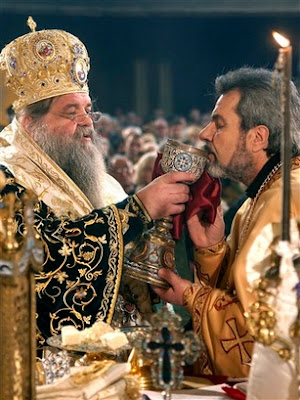 A priest, right, takes a communion from Macedonian Christian Orthodox Archbishop Stefan, left, during a holy Christmas Liturgy in St. Clement Cathedral in Macedonia's capital Skopje, on Monday, Jan. 7, 2008. Christmas falls on Jan. 7 for Orthodox Christians in the Holy Land, Russia and other Orthodox churches that use the old Julian calendar instead of the 16th-century Gregorian calendar adopted by Catholics and Protestants and commonly used in secular life around the world. (AP Photo/Boris Grdanoski)
A priest, right, takes a communion from Macedonian Christian Orthodox Archbishop Stefan, left, during a holy Christmas Liturgy in St. Clement Cathedral in Macedonia's capital Skopje, on Monday, Jan. 7, 2008. Christmas falls on Jan. 7 for Orthodox Christians in the Holy Land, Russia and other Orthodox churches that use the old Julian calendar instead of the 16th-century Gregorian calendar adopted by Catholics and Protestants and commonly used in secular life around the world. (AP Photo/Boris Grdanoski)![[Unam Sanctam]](https://blogger.googleusercontent.com/img/b/R29vZ2xl/AVvXsEiymQ2adTjpZ1ABhPBbBBquiPCxeQrc4Jy_97vOikT0wGQeJleriiXQy6ebnb0jrYe-TfvcK77txStB4aIwVAdD41ZdMkVfNtFGC0JX6LBV9B8mfeRZaIAM7Sj-011ag3DiKQzv/s1600/headerdivinemercy.jpg)











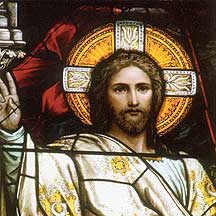







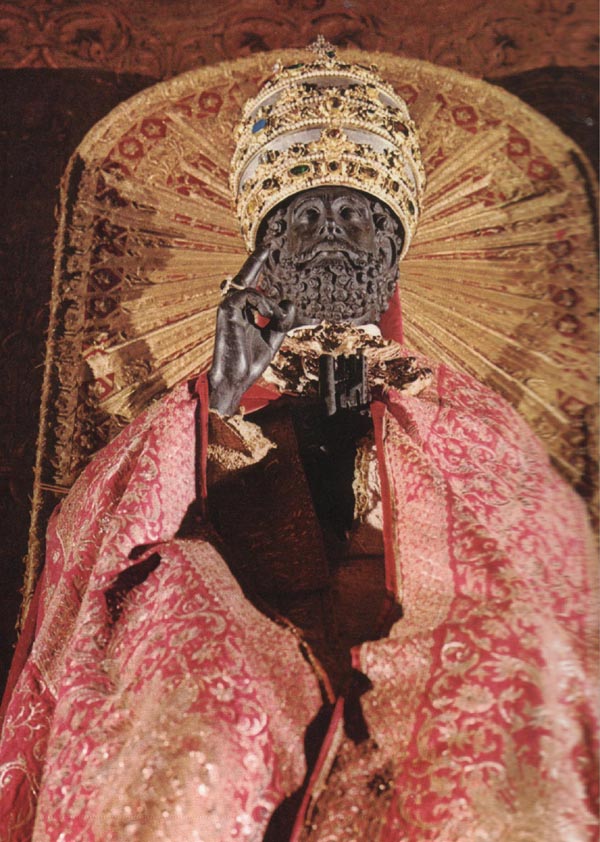
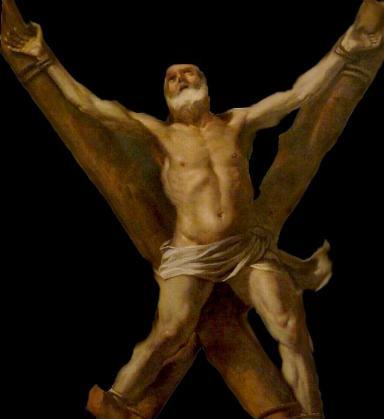




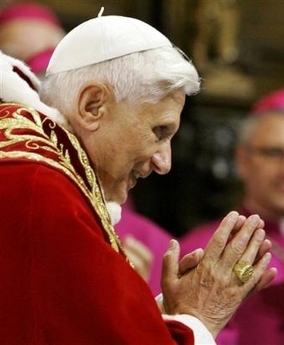






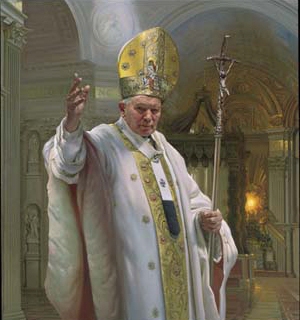
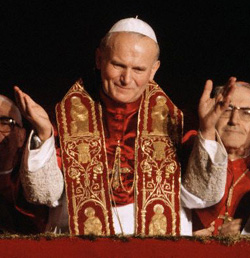
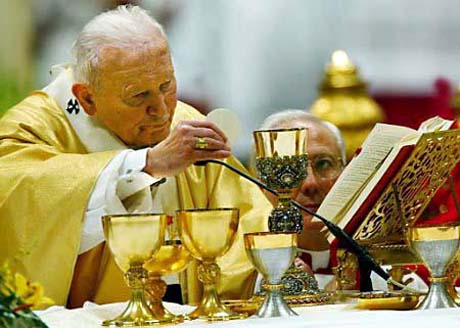







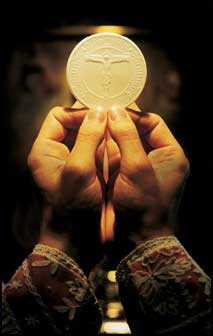
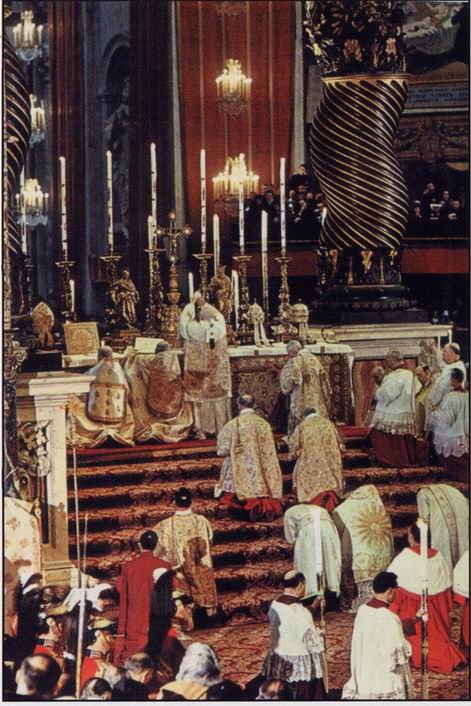

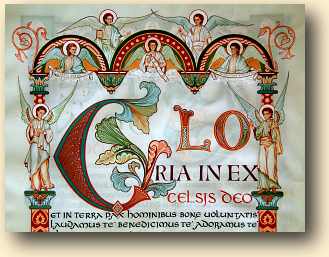

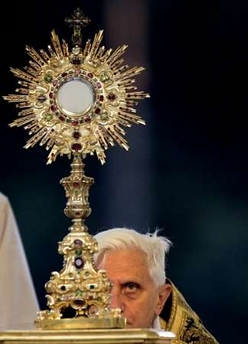


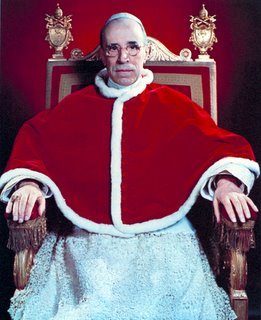




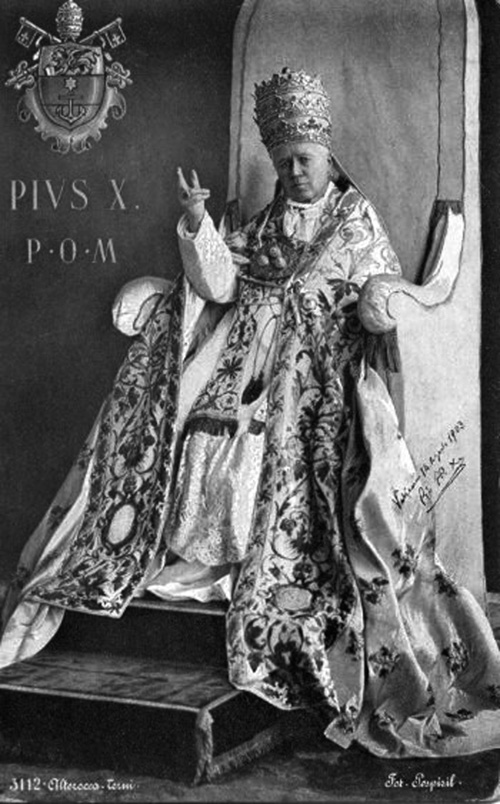



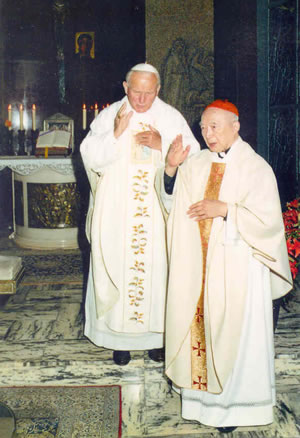





1 comment:
Fantastic work! Though it would be nice if we saw Christmas being celebrated in the Middle East, namely amongst the Antiochians (Orthodox and Melkite), Syriacs and the Assyrians.
Are you continuing? Lol.
Post a Comment